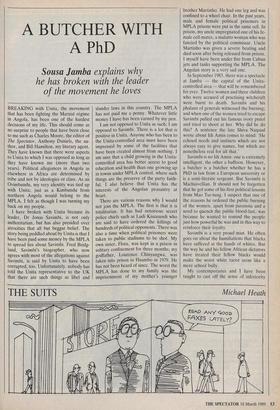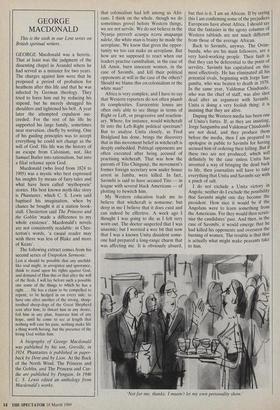A BUTCHER WITH A PhD
Sousa Jamba explains why
he has broken with the leader of the movement he loves
BREAKING with Unita, the movement that has been fighting the Marxist regime in Angola, has been one of the hardest decisions of my life, This should come as no surprise to people that have been close to me such as Charles Moore, the editor of The Spectator, Anthony Daniels, the au- thor, and Bill Hamilton, my literary agent. They have known that there were aspects to Unita to which I was opposed as long as they have known me (more than two years).. Political allegiances in Angola as elsewhere in Africa are determined by tribe and not by ideologies or class. As an Ovimbundu, my very identity was tied up with Unita; just as a Kimbundu from northern Angola would belong to the MPLA. I felt as though I was turning my back on my people.
I have brokeh with Unita because its leader, Dr Jonas Savimbi, is not only authoritarian, but has also presided over atrocities that all but beggar belief. The story being peddled about by Unita is that I have beeh paid some money by the MPLA to spread lies about Savimbi. Fred Bridg- land, Savimbi's biographer, who now agrees with most of the allegations against Savimbi, is said by Unita to have been corrupted, too. Unfortunately, nobody has told the Unita representative to the UK that there are such things as libel and slander laws in this country. The MPLA has not paid me a penny. Whatever little money I have has been earned by my pen. I am not opposed to Unita as such; I am opposed to Savimbi. There is a lot that is positive in Unita. Anyone who has been to the Unita-controlled area must have been impressed by some of the facilities that have been created almost from nothing. I am sure that a child growing in the Unita- controlled area has better access to good education and health than one growing up in towns under MPLA control, where such things are the preserve of the party faith- ful. I also believe that Unita has the interests of the Angolan peasantry at heart. There are various reasons why I would not join the MPLA. The first is that it is totalitarian. It has had notorious secret police chiefs such as Ludi Kissasundi who are said to have ordered the killings of hundreds of political opponents. There was also a time when political prisoners were taken to public stadiums to be shot. My own sister, Flora, was kept in a prison in solitary confinement for three months; my godfather, Lourenco Chinyangwa, was taken into prison in Huambo in 1979. He has not been heard of since. The worst the MPLA has done to my family was the imprisonment of my mother's younger brother Martinho. He had one leg and was confined to a wheel chair. In the past years, male and female political prisoners in MPLA prisons were put in the same cell. In prison, my uncle impregnated one of his fe- male cell-mates, a mulatto woman who was fancied by the political commissar. Uncle Martinho was given a severe beating and died soon after being released from prison. I myself have been under fire from Cuban jets and tanks supporting the MPLA. The Angolan story is a very sad one.
In September 1983, there was a spectacle at Jamba — the capital of the Unita- controlled area — that will be remembered for ever. Twelve women and three children who were accused of practising witchcraft were burnt to death. Savimbi and his phalanx of generals witnessed the burning; and when one of the women tried to escape Savimbi pulled out his famous ivory pistol and tried to shoot at her. Why did he do this? A sentence the late Shiva Naipaul wrote about Idi Amin comes to mind: 'He echoed needs and instincts which are not always easy to give names, but which are nonetheless real for all that.'
Savimbi is no Idi Amin: one is extremely intelligent, the other a buffoon. However, a butcher is a butcher whether he has a PhD in law from a European university or is a semi-literate sergeant. But Savimbi is Machiavellian. It should not be forgotten that he got some of his first political lessons from Mao Tse-tung. I suspect that one of the reasons he ordered the public burning of the women, apart from paranoia and a need to quench the public blood-lust, was because he wanted to remind the people just how powerful he was and in this way to reinforce their loyalty.
Savimbi is a very proud man. He often goes on about the humiliations that blacks have suffered at the hands of whites. But the way he and his fellow African dictators have treated their fellow blacks would make the worst white racist seem like a mere school bully.
My contemporaries and I have been taught to cast off the sense of inferiority
that colonialism had left among us Afri- cans. I think on the whole, though we do sometimes grovel before Western things, we are not servile. We do not believe in the Nyanja proverb azungu nzeru anapanga ndeke, the white man is brainy he made the aeroplane. We know that given the oppor- tunity we too can make an aeroplane. But how are we supposed to react when our leaders practise cannibalism, in the case of Idi Amin, burn innocent women, in the case of Savimbi, and kill their political opponents at will in the case of the others? Should we blame this on colonialism or the white man?
Africa is very complex; and I have to say that Western reporters do not often plumb its complexities. Eurocentric lenses are often only able to see things in terms of Right or Left, or progressive and reaction- ary. Where, for instance, would witchcraft fit into the Left-Right political spectrum? But to analyse Unita closely, as Fred Bridgland has done, brings the discovery that in this movement belief in witchcraft is deeply .embedded. Politicp1 opponents are often executed after being accused of practising witchcraft. That was how the parents of Tito Chingunji, the movement's former foreign secretary now under house arrest in Jamba, were killed. In fact, Savimbi is said to have accused Tito — in league with several black Americans — of plotting to bewitch him.
My Western education leads me to believe that witchcraft is nonsense; but deep in me I believe that it does exist and can indeed be effective. A week ago I thought I was going to die as I felt very worn out. The doctor suspected that I was anaemic; but I worried a wee bit that now that I was a known Unita dissident some- one had prepared a long-range charm that was affecting me. It is obviously absurd, but that is it. I am an African. If by saying this I am confirming some of the prejudices Europeans have about Africa, I should say that the fantasies in the agony columns of Western tabloids are not much different from those of the average African. Back to Savimbi, anyway. The Ovim- bundu, who are his main followers, are a very hard-working people. Their fault is that they can be deferential to the point of servility. Savimbi has capitalised on this most effectively. He has eliminated all his potential rivals, beginning with Jorge San- gumba, who was beaten to death in 1979. In the same year, Valdemar Chindondo, who was the chief of staff, was alsO shot dead after an argument with Savimbi. Unita is doing a very foolish thing: it is insisting that they are alive.
Duping the Western media has been one of Unita's fortes. If, as they are insisting, Jorge Sangumba and Valdemar Chindondo are not dead, and they produce them before the media, then I am prepared to apologise in public to Savimbi for having accused him of ordering their killing. But if these two are not produced, which will definitely be the case unless Unita has invented a way of bringing the dead back to life, then journalists will have to take everything that Unita and Savimbi say with a pinch of salt. I do not exclude a Unita victory in Angola; neither do I exclude the possibility that Savimbi might one day become the president. How nice it would be if the Angolans were to learn something from the Americans. For they would then scruti- nise the candidates' past. And then, in the case of Savimbi, it would emerge that he had killed his opponents and overseen the burning of women. The trouble is that that is actually what might make peasants take to him.
Not for me, thanks. 1 mustn't let my own personality show.'



























































 Previous page
Previous page